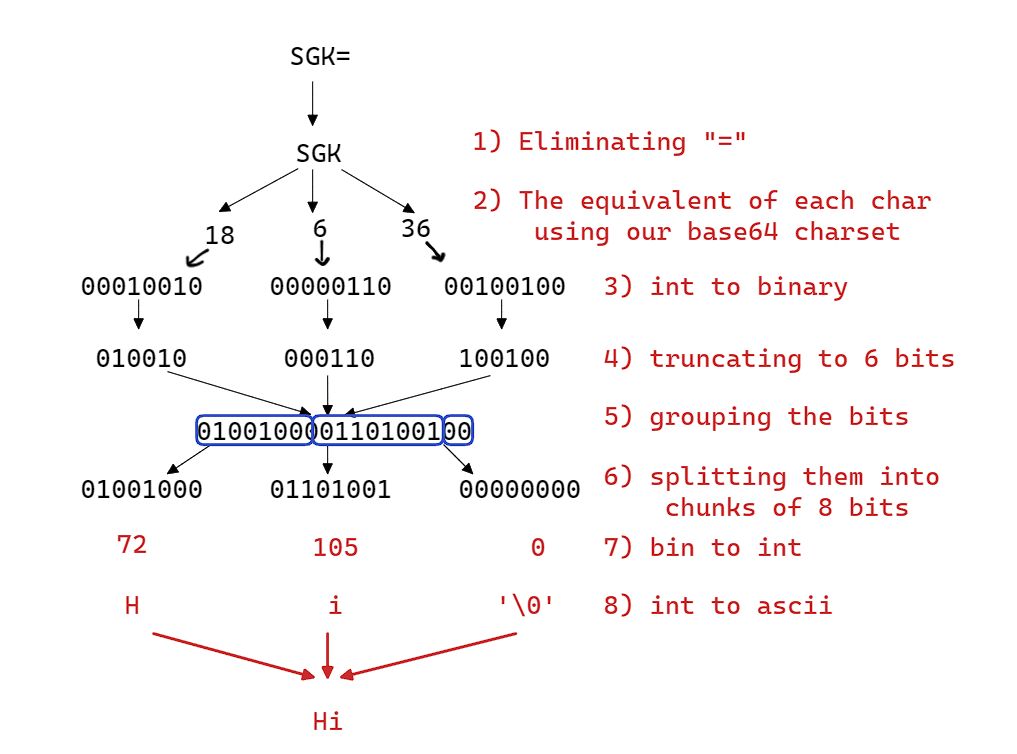Hello friend,
In this post, we are going to continue from where we left off, please check the first part if you haven’t.
In the previous post, we built a base64 encoder. Now we are going to be building a decoder, working our way backwards.
Creating the decoder
Theory
Here is how it is going to work :
Implementation
Here is the complete function, respecting the steps above.
1
2
3
4
5
6
7
8
9
10
11
12
13
14
15
16
17
18
19
20
21
22
23
24
25
26
27
28
29
30
31
def b64_decode(word):
#stripping away '='
word = word.split("=")[0]
#finding the index of each character in b64_index_table
indexes = []
for c in word:
indexes.append(base64_symbol_table.index(c))
# index to binary ( 6 bits)
binary = []
for i in indexes:
binary.append(bin(i).split("b")[-1].rjust(6,'0'))
# groupping the bits together
binary = "".join(binary) # this is a string
# forming group of 8 bits
new_word = []
while len(binary):
new_word.append(binary[0:8])
binary = binary[8:]
# transform each byte to its ascii representation
result = ""
for c in new_word:
result += chr(bin_to_int(c)) #you can use int(c,2)
# instead of bin_to_int(c)
return result
1
2
word = "SGk="
print(b64_decode(word))
1
2
Program stdout
Hi
Adding a main function
All working as expected, now let’s add a main function to hundle user input.
Here is the expected behaviour:
1
2
python b64.py
[/_\] Usage : python b64.py <string> (-d | -e )
1
2
3
4
5
python b64.py Hi -e
[+] Hi ---> SGk=
python b64.py SGk= -d
[+] SGk= ---> Hi
You can have fun implementing your own functionalities, here is a simple one using the sys module.
1
2
3
4
5
6
7
8
9
10
11
12
13
14
15
16
if __name__ == '__main__':
len_args = len(sys.argv)
if (len_args != 3):
print(f"[] Usage : python {sys.argv[0]} <string> (-d | -e )")
exit(0)
option = sys.argv[2]
if not (option == '-d' or option == '-e'):
print(f"[] Usage : python {sys.argv[0]} <string> (-d | -e )")
exit(0)
word = sys.argv[1]
if (option == '-d'):
print(f"[+] {word} ---> {b64_decode(word)}")
else:
print(f"[+] {word} ---> {b64_encode(word)}")
Wrapping up
Putting all of it together, we get something like this
1
2
3
4
5
6
7
8
9
10
11
12
13
14
15
16
17
18
19
20
21
22
23
24
25
26
27
28
29
30
31
32
33
34
35
36
37
38
39
40
41
42
43
44
45
46
47
48
49
50
51
52
53
54
55
56
57
58
59
60
61
62
63
64
65
66
67
68
69
70
71
72
73
74
75
76
77
78
79
80
81
82
83
84
85
86
87
88
89
90
91
92
93
94
95
96
97
98
99
100
101
102
import sys
# creating base64 table index
A_Z = [chr(i) for i in range(65,91)]
a_z = [chr(i) for i in range(97,123)]
zero_nine = [chr(i) for i in range(48,58)]
additional_chars = ['+','/']
base64_symbol_table = A_Z + a_z + zero_nine + additional_chars
# binary to decimal custom function
def bin_to_int(byte):
#110101
result = 0
k = 1
for i in range(0,len(byte)):
result += int(byte[len(byte) - 1 - i]) * k
k = k * 2
return result
def b64_encode(word):
# converting the word into its binary format
binary = []
for c in word:
binary.append(bin(ord(c)).split("b")[-1].rjust(8,'0'))
binary = "".join(binary)
# splitting the binary format into chunks of 6 bits
new_word = []
while len(binary):
new_word.append(binary[0:6])
binary = binary[6:]
# adding padding to the last elem
new_word[-1] = new_word[-1].ljust(6, '0')
# encrypting the text
result = ""
for byte in new_word:
index = bin_to_int(byte)
result += base64_symbol_table[index]
# adding padding of "="
def get_multiple_of_4(num):
while num % 4 != 0:
num += 1
return num
result = result.ljust(get_multiple_of_4(len(result)),'=')
return result
def b64_decode(word):
#stripping away '='
word = word.split("=")[0]
#finding the index of each character in b64_index_table
indexes = []
for c in word:
indexes.append(base64_symbol_table.index(c))
# index to binary ( 6 bits)
binary = []
for i in indexes:
binary.append(bin(i).split("b")[-1].rjust(6,'0'))
# groupping the bits together
binary = "".join(binary) # this is a string
# forming group of 8 bits
new_word = []
while len(binary):
new_word.append(binary[0:8])
binary = binary[8:]
# transform each byte to its ascii representation
result = ""
for c in new_word:
result += chr(bin_to_int(c)) #you can use int(c,2)
# instead of bin_to_int(c)
return result
if __name__ == '__main__':
len_args = len(sys.argv)
if (len_args != 3):
print(f"[/_\\] Usage : python {sys.argv[0]} <string> (-d | -e )")
exit(0)
option = sys.argv[2]
if not (option == '-d' or option == '-e'):
print(f"[/_\\] Usage : python {sys.argv[0]} <string> (-d | -e )")
exit(0)
word = sys.argv[1]
if (option == '-d'):
print(f"[+] {word} ---> {b64_decode(word)}")
else:
print(f"[+] {word} ---> {b64_encode(word)}")
That’s it for this article, hope you learned something !

